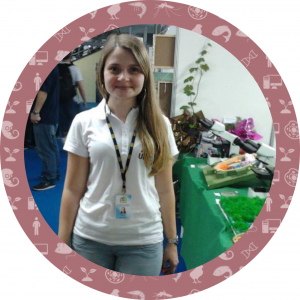Speakers 2019
Follow our website to stay updated about our team of speakers!

Professor Andréa Trentin, Ph.D.
Professor Andréa Trentin holds a bachelor’s degree in Biological Sciences from the Universidade Santa Úrsula (Rio de Janeiro), a Master’s degree in Biochemistry from the Universidade Federal do Rio de Janeiro, a Ph.D. in Biochemistry from the same university and a post doctorate at the Skin Regeneration Center of the Hôpital Saint-Louis (Paris). She is currently a Professor at UFSC and a member of the faculty of the Cell & Developmental Biology Graduate Program. Professor Andréa also coordinates the Laboratório de Células-Tronco e Regeneração Tecidual (LACERT), working mainly on the following topics: skin and nervous system regeneration, stem cells, cell therapy, neural crest and aging.

Professor Antônio Bernardo de Carvalho, Ph.D.
Guest speaker
Professor Antônio holds a master’s degree and Ph.D. in Biological Sciences (Genetics) from the Universidade Federal do Rio de Janeiro, where he is currently an Associate Professor. He is the corresponding author of articles published in Nature, Nature Genetics, Science, PNAS, Genetics, Genome Research and Heredity. He is Pew Latin American Fellow (1998-2000), Guggenheim Fellow (2012), NIH Principal Investigator (2006-2009; 2009-2013), Scientist of Our State (FAPERJ), Welcome Trust Principal Investigator (IA Award) (2018 -2022), and since 2018 has been an associate member of the European Molecular Biology Organization (EMBO). He was awarded as advisor at the CAPES Thesis Grand Prize (2010). He is currently a member of the INCT-Molecular Entomology Steering Committee and the Executive Committee of the National Institutes of Health Alumini Association – Brazil (NIHAABR; 2009-2012 and 2013-2016); He was a member of the Higher Graduate Council of the Institute of Biology (2006-2012), and of the International Program Committee of the International Congress of Genetics (Berlin, 2008). Professor Antônio has experience in Genomics, Evolution, Genetics and Bioinformatics, focusing on Drosophila Genomics, Y Chromosome Evolution, Population Genetics and Evolution of Sex Ratio.

Professor Evelise Maria Nazari, Ph.D.
Professor Evelise holds a bachelor’s degree in Biological Sciences from the Universidade Federal de Santa Catarina, a master’s degree in Aquaculture from the Universidade Federal de Santa Catarina and a Ph.D. in Morphological Sciences from the Universidade Federal do Rio de Janeiro. She is a professor at the Universidade Federal de Santa Catarina and has experience in morphology, with emphasis on Embryology and Reproduction. Permanent member of the Cell & Developmental Biology Graduate Program and the Professional Master’s Degree in Biology Teaching (PROFBIO) at UFSC. Currently she is the President of the Laboratório Multiusuário de Estudos em Biologia (LAMEB) of the Biological Sciences Center/UFSC.

Professor Franceli Kulcheski, Ph.D.
Professor Franceli holds a bachelor’s degree in Biological Sciences fromthe Universidade Federal do Rio Grande do Sul with emphasis on molecular, cellular and functional biology; a master’s degree in Plant Genetic Improvement with emphasis on plant biotechnology by the Phytotechnology program of the Faculdade de Agronomia of the Universidade Federal do Rio Grande do Sul; and a Ph.D. in the Cellular and Molecular Biology Graduate Program, from the Universidade Federal do Rio Grande do Sul, with sandwich period at the Max-Planck Institute for Developmental Biology. She also developed postdoctoral studies in the area of Cellular and Molecular Biology. She is currently an assistant professor in the Department of Cellular Biology, Embryology and Genetics at theUniversidade Federal de Santa Catarina and a member of the faculty of the Cell & Developmental Biology Graduate Program. She studies microRNAs and RNAi machinery components in plants, as well as their roles in responses to biotic and abiotic stresses.

Professor Geison Souza Izídio, Ph.D.
Professor Geison holds a bachelor’s degree in Biological Sciences, a Master’s degree and a Ph.D. in Pharmacology of the Central Nervous System by the Universidade Federal de Santa Catarina, besides a post doctorate in Psychobiology at the Laboratory of Memory Studies at the Universidade Federal do Rio Grande do Norte. He was a member of the board of the Brazilian Society of Genetics, regional of Santa Catarina, and is currently a professor and researcher at the Universidade Federal de Santa Catarina. Professor Geison coordinates the Laboratory of Genetics of Behavior, and is a member of the faculty of the Pharmacology Graduate Program and Cell & Developmental Biology Graduate Program, of which he is currently the coordinator.

Professor Geisson Marcos Nardi, Ph.D.
Professor Geisson holds a bachelor’s degree in Pharmacy from the Universidade Federal de Santa Catarina (1999), with a master’s degree (2002) and a Ph.D. (2011) in Pharmacology from the same institution. He is currently a professor at the Department of Morphology of Universidade Federal de Santa Catarina and a member of the faculty of the Cell & Developmental Biology Graduate Program. Professor Geisson conducts research activities in the field of pharmacology with emphasis on the study of bioactive compounds derived from medicinal plants with analgesic, antioxidant, anti-inflammatory and cardiovascular activity. In addition, he also investigates the cardiovascular changes resulting from the infectious process during septic shock.

Professor Guilherme Razzera, Ph.D.
Guest speaker
Professor Guilherme holds a bachelor’s degree in Biological Sciences at the Universidade Federal de Santa Catarina, a Master’s degree in Biotechnology from the same university, a Ph.D. in Biological Chemistry at the Universidade Federal do Rio de Janeiro and a post-doctorate at the Centro Nacional de Ressonância Magnética Nuclear (CNRMN). He recently developed postdoctoral studies at the Multiscale Modeling Lab, working with Molecular Dynamics and Simulation (ITQB, Portugal and Groningen University, The Netherlands). Professor Guilherme is currently Adjunct Professor of the Department of Biochemistry at UFSC, where he coordinates the Laboratório de Bioinformática Estrutural and is one of the coordinators of LABCAI (Laboratório de Biomarcadores de Contaminação Aquática e Imunoquímica). Has experience in the area of molecular biology, structural protein biology, modeling and molecular dynamics of complex systems; working on health and toxicology topics.

Professor Juliana Dal-Ri Lindenau, Ph.D.
Professor Juliana holds a bachelor’s degree in Biological Sciences, a master’s degree and Ph.D. in Genetics and Molecular Biology (2016) from the Universidade Federal do Rio Grande do Sul. She also holds two postdoctoral degrees, one of them in Genetics and Molecular Biology and the other in Endocrinology from the same institution. Professor Juliana has experience in the field of Human and Medical Genetics, working mainly in the following subjects: population genetics, immunogenetics of infectious diseases, pharmacogenetics of anti-malaria drugs and Parkinson’s disease.

Professor Luísa Damazio Rona Pitaluga, Ph.D.
Professor Luíza Pitaluga holds a bachelor’s degree in Biological Sciences from the Universidade Federal de Santa Catarina (UFSC), a master’s degree and Ph.D. in Cell and Molecular Biology from the Fundação Oswaldo Cruz and a Postdoctorate in Bioinformatics from the same institution. She went abroad from 2016 to 2018 for the development of a scientific project at Imperial College London (UK) and is currently an Assistant Professor of the Department of Cellular Biology, Embryology and Genetics at UFSC. She has experience in molecular biology and insect genetics, working mainly on the following topics: population genetics, molecular evolution and bioinformatics. Professor Luíza is a member of the faculty of the Cell & Developmental Biology Graduate Program at UFSC and belongs to the Research Group: Biology and Genetics of Vectors.

Professor Ricardo Castilho Garcez, Ph.D.
Professor Ricardo holds a bachelor’s degree in Biological Sciences from the Universidade Federal de Santa Catarina, a Master’s Degree and Ph.D. in Neuroscience from the same university, the last with a period at the National Center for Scientific Research – CNRS (France). He also completed post-doctoral training at the CNRS (France). He is currently a professor in the Department of Cellular Biology, Embryology and Genetics and a member of the faculty of the Cell & Developmental Biology Graduate Program at UFSC. Professor Ricardo has experience in the area of Cellular, Molecular and Developmental Biology, working mainly on the following topics: cell differentiation mechanisms; development of neural crest derivatives; craniofacial development; molecular signaling in development.

Professor Rogério Margis, Ph.D.
Guest speaker
Professor Rogerio completed his Ph.D. at the Institut de Biologie Moleculaire des Plantes, IBMP of CNRS, at the Université Louis Pasteur de Strasbourg I, France. In 2002 he carried out postdoctoral studies related to RNA interference processes and production of microRNAs in plants at the Plant Industry in Canberra, Australia. He is currently a researcher at CNPq and a Professor at the Biophysics Department and Biotechnology Center at the Universidade Federal do Rio Grande do Sul (UFRGS). He has been a Full Member of the Brazilian Academy of Sciences since 2016. At UFRGS he works as a permanent researcher and adviser in the graduate programs of Genetics and Molecular Biology (PPGBM) and Molecular and Cell Biology (PPGBCM). Professor Rogério currently participates in research projects related to the following topics: interference RNA processes, small RNAs and non-coding RNAs in rice, soybean and neotropical native species; action of cysteine proteases and their inhibitors; proteins related to abiotic stresses (cold, dry and metals) and oxidative stress (APx and GPx). He works in the areas of Genetics and Biochemistry, with emphasis in Molecular Biology: regulation of gene expression and molecular markers.

Professor Viviane Glaser, Ph.D.
Professor Viviane holds a bachelor’s degree in Biological Sciences from the Fundação Universidade Regional de Blumenau (2007), a Master’s degree in Biochemistry from the Federal University of Santa Catarina (2010) and a Ph.D. in Neuroscience from the same university (2014). She is currently a professor of the Federal University of Santa Catarina and a member of the faculty of the Cell & Developmental Biology Graduate Program, developing research in the field of neurotoxicity.

Professor Yara Costa Netto Muniz, Ph.D.
Professor Yara holds a bachelor’s degree in Biological Sciences from theUniversidade Federal de Santa Catarina, a master’s degree and PhD in Genetics by the Faculdade de Medicina de Ribeirão Preto (FMR/USP). She concluded her first post doctorate by the Department of Clinical Medicine (Division of Clinical Immunology – FMRP / USP) and the second in the Commissariat à l’énergie atomique et aux énergies alternatives (Paris, France). Her third post doctorate was developed in the Cell & Developmental Biology Graduate Program at UFSC, working with complex diseases and HLA-G. Professor Yara is currently a professor at UFSC and a member of the faculty of the Cell & Developmental Biology Graduate Program and the Professional Master’s Degree in Biology Teaching. She has experience in the area of Molecular Biology and Human Genetics, working mainly on the following topics: genetic polymorphisms, population stratification and ancestry, case control studies with autoimmune diseases and cancer.

Professor Yara Maria Rauh Müller, Ph.D.
Professor Yara has a bachelor’s degree in Natural History from Universidade Santa Ursula, a master’s degree in Histology and Embryology from the Universidade Federal do Rio de Janeiro and a Ph.D. in Zoology and Embryology by the Universität Erlangen-Nurnberg in Germany. She is a professor at the Universidade Federal de Santa Catarina, where she teaches in undergraduate courses and Graduate Programs, besides developing projects in research and extension. Currently she is a member of the faculty of the Cell & Developmental Biology Graduate Program and of the Professional Master’s Degree in Biology Teaching. Professor Yara develops research in the following topics: “cellular and molecular mechanisms of development”, “embryotoxicity, cytotoxicity and genotoxicity”, “communication, teaching and learning in Biology” and “organization and operation of organisms”.

Professor Zenilda Laurita Bouzon, Ph.D.
Professor Zenilda holds a bachelor’s degree in Biological Sciences from the Universidade Federal de Santa Catarina, a master’s degree in Cellular and Molecular Biology from the Universidade Federal do Paraná and a Ph.D. in Biological Sciences (Botany) from the Universidade de São Paulo. She is currently a professor at the Universidade Federal de Santa Catarina and a member of the faculty of the Cell & Developmental Biology Graduate Program and the Plant Biology Graduate Program. Professor Zenilda has experience in the field of Botany, with emphasis on plant cells under the action of ultraviolet radiation and heavy metals.





